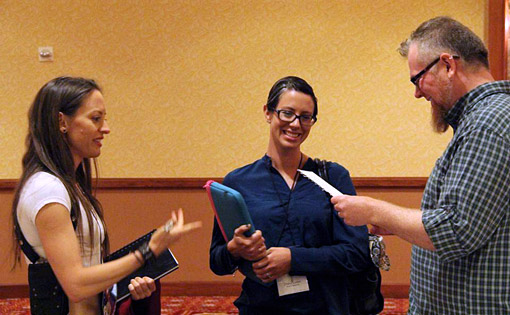
Anna Maltese (left) presents Daniel Loxton with a bizarre coincidence after his talk at The Amazing Meeting 2014, while his wife Cheryl Hebert looks on. (Photograph by David Patton. Used with permission.)
There are few experiences so striking—so deeply imbued with apparent meaning—as a remarkable coincidence. But when is a coincidence genuinely meaningful rather than merely unexpected? And when is it neither, but instead (as skeptical psychologist Joseph Jastrow described such happenstances in 1900) “just what the normal distribution of such phenomena would lead us to expect”?1 People often find it difficult to view such subjectively jarring experiences from a statistical perspective, even when analysis of the odds is in fact possible. (Sometimes it isn’t.) As Jastrow observed,
It would be pleasant to believe that the application of the doctrine of chances to problems of this character is quite generally recognized; but this recognition is so often accompanied by the feeling that the law very clearly applies to all cases but the one that happens to be under discussion, that I fear the belief is unwarranted.2
Tackling that very challenge is The Odds Must Be Crazy, a blog and regular audio segment on Skepticality—The Official Podcast of Skeptic Magazine. The lighthearted segment presents listener tales about stunning coincidences, then offers statistical analysis and discussion from INSIGHT’s own Barbara Drescher.
Recently I was asked to contribute an anecdote of my own about a weird coincidence I experienced immediately after my speech for The Amazing Meeting 2014 conference in Las Vegas. (Read the text of the talk, titled “A Rare and Beautiful Thing,” or watch the video on YouTube.)
For my coincidence story, involving United States President Theodore Roosevelt, please watch the short video below. My thanks to John Rael and Anna Maltese (standing in for regular co-host Wendy Hughes) for this wonderful discussion!
https://youtu.be/GdG8Pv2s66I
References
- Joseph Jastrow. Fact and Fable in Psychology. (New York: Houghton Mifflin Company, 1900). p. 83
- Ibid.











Thanks, @Edward Clint – worked great.
I’ve been trying to submit my coincidence over at The Odds Must be Crazy, and I can’t get past the question “Are you human?” and there doesn’t seem to be a Captcha or anything.
Anybody know the answer? It’s not “Yes” or “Yes.” I’m hoping maybe someone from TOMBC will see this here.
Did you try lowercase “yes”?
Maybe they don’t accept submissions from humans.
How do we know you’re not a robot? By your own admission you’ve repeatedly tested positive for robot.
Just kidding. The “correct” answer is “yes” without capitalization or punctuation. I’ve edited the text of the question to clarify that. Sorry you had trouble with it.
cheers,
Ed
There is much to admire in the life of Teddy Roosevelt, but there is at least one black mark on it — He called Thomas Paine “a filthy little atheist.”
This is an example of one famous skeptic attacking another.
Skeptical minds think alike